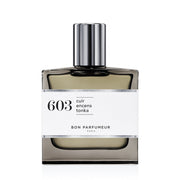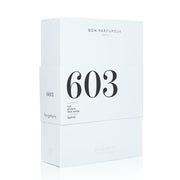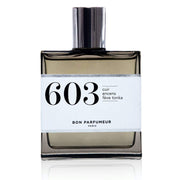603: Leather, Incense and Tonka Eau de Parfum by Le Bon Parfumeur
- Home
- All
- 603: Leather, Incense and Tonka Eau de Parfum by Le Bon Parfumeur
603: Leather, Incense and Tonka Eau de Parfum by Le Bon Parfumeur
Product Description:
This daring fragrance opens on dark and intense notes with spicy yet floral aromas. Frankincense adds freshness and mystery to the body of the fragrance. The notes of leather and tonka lend a sensual dimension to this eau de parfum. With both warm and green amber hints, woody fragrance 603 will surprise you with its generosity.
What is frankincense?
Frankincense or oliban, found in the southern Arabian Peninsula as well as in northeast Africa and India, is a resin obtained by making incisions into a tree from the Burseraceae family. Considered to be the oldest fragrance in the world, frankincense has been used in the rituals of many religions and civilizations. Frankincense takes us back to the sacred origins of perfume, from the Latin “per-fumum” (by means of smoke), as it allowed people to communicate with the gods by means of its fragrant smoke. Its powerful olfactory symbolism has stood the test of time and traveled across borders. It adds woody, coniferous, fresh, camphoric and spicy notes.
What is tonka bean?
The tonka bean comes from Dipteryx odorata, a tree that can grow up to 40 m (131 ft) tall and which produces a mango-shaped fruit containing a single seed: the tonka bean itself. It must be left to dry for one year, during which time white crystals appear: the coumarin that gives it such a powerful aroma and actually makes up 50 to 70%! After all this, the precious absolute can be extracted using solvents so we can finally enjoy it. In terms of its scent, tonka bean presents a succession of sweet, balsamic and tobacco notes, with a slightly rustic top note of dried hay and a warm and gourmand base note with accents of vanilla, toffee, condensed milk and almond.
What is the leather note in perfumery?
Leather is a material obtained from the hide of an animal. It is mainly used in clothing and to manufacture leather goods. Originally, leather smelled bad. In the 17th century, people had the idea to scent it, starting with gloves, the essential accessory of the time. The occupation of “gloverperfumer” was born. At the time the town of Grasse, a renowned center for leather tanning, developed essences intended to scent leather, such as orange blossom, musks, ambergris and other raw materials from animals. In perfumery, the difficulty lies in recreating the distinctive scent of leather. To do this, “pyrogenic” notes are used like birch, cade juniper or styrax, along with other components such as animalistic, honey or tobacco notes. It’s impossible to talk about leathery scents without mentioning Chanel’s Cuir de Russie; very elegant and marvelously balanced, it mingles notes of blond tobacco with a jasmine heart.
Mix & Match:
Become your very own perfumer by mixing two fragrances together. Strike the right balance for a result that is just as unique as you are. Tempted by a floral leather scent? We suggest combining it with 103.
Produced by Ludovic Bonneton, former digital director of Yves Rocher, Le Bon Parfumeur is a Paris-based company producing perfumes containing three basic scents. Designed to be mix-and-match, the collection is coordinated by color label with the first digit of the scent signifying scent family.
The Le Bon Parfumeur Collection is available here.





